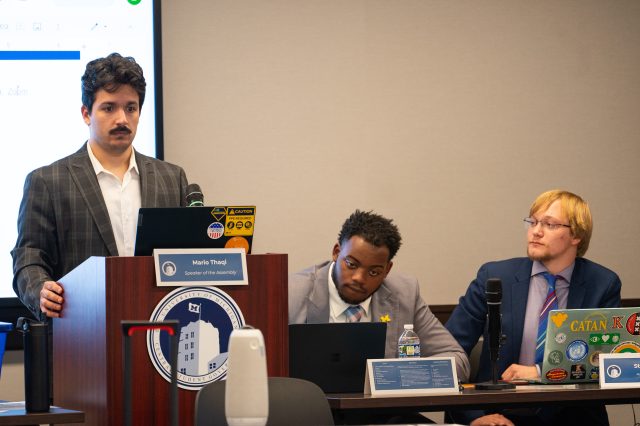[ad_1]
The University of Michigan Central Student Government met in the Wolverine Room in the Michigan Union Tuesday evening to discuss resolutions related to the cost of textbooks and class materials, Counseling and Psychological Services for students and standing rules for the assembly.
CSG heard executive reports from its different committees on the past week’s activities and achievements. During the report, Law School student Tyler Watt, CSG general counsel, questioned CSG Vice President Elias Atkinson about what he and CSG President Alifa Chowdhury, who was not at the meeting, have been working on. Watt told The Michigan Daily in an interview that he questioned Atkinson because he felt the Assembly was not sufficiently informed about the actions of the executive branch.
“We have not received what I would describe as a normal executive report ever since this administration took office this past April,” Watt said. “Now, that’s highly unusual because typically an executive report, as we’ve seen in past administrations, details who the president has been meeting with that week, what projects they’re working on, what legislation they’re working on and perhaps even what folks from other schools or admin they can come with.”
Watt said he believes executive reports are important as they hold the executive branch accountable for actions they take while representing CSG.
“It’s highly important for the Assembly to know what folks up front are doing because they’re doing it in CSG’s name,” Watt said. “They represent all of us when they’re out in the world, and if we don’t have reports, then we kind of are lacking accountability, which is why I think it’s healthy to politely, though firmly, ask questions about what our leaders (are) doing. I think every student has a right to do so.”
Later during the meeting, LSA sophomore Amr Brown, CSG representative, introduced The Textbook Transparency Act, which would allow students to view required materials for classes before the semester starts in order to plan their finances. In an interview with The Daily, Brown spoke about his hopes for the act.
“We came to the idea through a conversation with executive leadership at U-M Dearborn for their Senate on how this was an issue on their campus and how we can relate it to Ann Arbor and Flint as well,” Brown said. “We want to lessen the financial burden on students because let’s face it, they’re already paying tens of thousands of dollars for tuition and those costs add up, especially when you buy those materials for classes.”
The Assembly then passed two resolutions — Improving CAPS Part 1 and Creation of Assembly Standing Rules — with unanimous consent.
AR 14-027 is a resolution to increase accessibility to the mental health services offered by the Counseling and Psychological Services at the University, with a focus on improving quality of and access to care for Black students. The resolution formally requests that the U-M administration increases access to services tailored to Black students through funding and staff training on cultural competence and sensitivity.
AR 14-030 establishes six standing rules for the Assembly. The rules addressed decorum in the meetings’ Zoom chats and established a precedent of reading a Land and Labor Acknowledgement immediately preceding the first roll call to establish quorum. The rules would also implement DEI table talks during meetings, or discussions in which CSG invites an affinity-based student organization to present and answer questions from the Assembly during a meeting.
The rules committee also discussed AR 14-031, a resolution to refine the process in which ex-officio members are selected. The resolution clarifies the duties of the Executive Nominations Committee, which reviews all nominations by LSA senior Mario Thaqi, CSG speaker of the assembly, and holds hearings to deliberate nominations before reporting recommendations to the Assembly. The resolution passed with 22 votes for the resolution, 6 against and 4 in abstention.
Erin Neely, Rackham representative and vice chair of the rules committee, said in an interview with The Daily that students who qualify for the ex-officio seats are selected because their unique backgrounds add important perspectives to CSG’s discussions.
“They are first year undergrad, first year grad, transfer, international students, non-traditional students and someone who is Pell Grant eligible,” Neely said. “Because of these more specific qualifications, it’s easier logistically to have appointed rather than elected seats. The ex-officio members cannot vote, but they can speak and introduce legislation.”
While the Assembly has not received nominations from the speaker so far this year, Watt said the resolution was created to ensure that CSG nominations are properly deliberated and include conversation among multiple assembly members.
“Another part is the general concern about investing too much power into one person, the idea instead is to have a group of assembly members with more diverse backgrounds, perspectives because there’s more of them,” Watt said. Daily Staff Reporter Grace Lee can be reached at graceyl@umich.edu.
Related articles
[ad_2]
Source link











